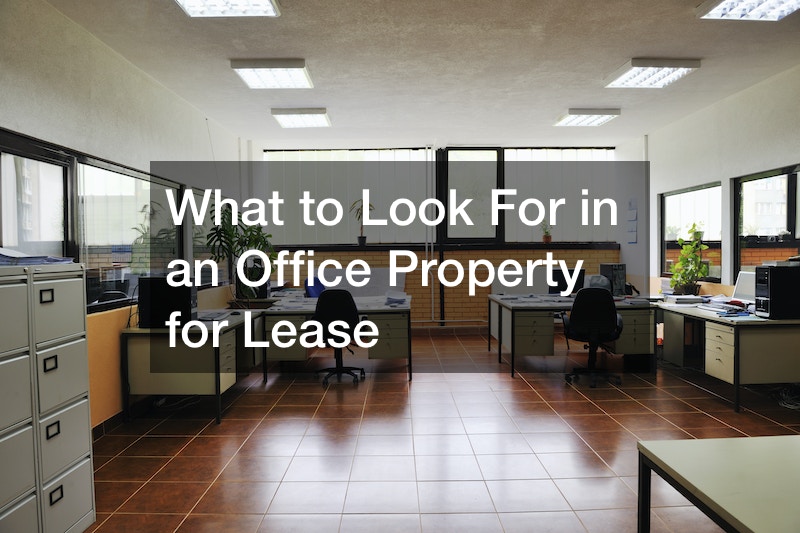

Managing corporate real estate is no easy feat. This is especially true for finding and securing new premises and executing new leases. From the first assessment of your company’s needs to finally opening up a shop, several moving pieces require careful management throughout the process. While the priorities of each firm vary, the following is a list of qualities to look for in an office property for lease.
1. Do Some Homework
When looking for office property for lease, start your planning early to ensure that you choose a location that is best suited to your needs. This will help you avoid signing a rental agreement under pressure. It’ll also leave you with enough time to spare in case the need arises. Planning gives you plenty of time to consider multiple options. Learn as much as you can about the rental space. For instance, check to determine if the office space is truly available and if the landlord calculated the fee based on actual square footage. This is why it’s crucial to visit the workplace you’re thinking of renting and ensure the landlord gives you the full tour. View the smaller offices in the building first before looking for a workspace to rent; the landlord could offer you incentives to rent a bigger space after you’re on the property.
2. Location
No matter what kind of business you run, location is among the most crucial factors to take into account when searching for new office space. You should be able to readily and economically access the office or warehouse by automobile or public transit. You want your staff and clients to have an easy commute. If you don’t currently have a staff or customers, pick a populated and safe area that serves your type of business.
3. Parking and Transport
Determine whether the area of the office property for lease is served by public transport and a good road network. The office space should be convenient for you, your coworkers, your customers, and the courier pick-up and delivery. Easy-to-access office space can positively impact your personal work life, the lives of your personnel, and the accessibility of your company to clients. It can also have an impact on the future pool of candidates you’re likely to employ. Consider whether there are convenient and safe parking spots for you, your clients, staff, and couriers. Also, confirm how expensive the parking is to avoid incurring unmanageable daily expenses.
4. Visibility
Check whether the potential office space is easy to find or whether it will present a challenge for customers trying to find you. Consider the amount of foot traffic your office is likely to attract. Depending on the goods or services you provide, passing trade and visibility might be crucial factors in your company’s success. You may miss valuable opportunities if no one can locate you or even knows you’re there. Being visible helps to spread brand awareness.
5. Neighborhood Reputation
When looking for an office property to lease, consider the reputation of the neighborhood. This is important as it greatly affects how potential customers view your business. If the neighborhood has a negative image and deters potential consumers or clients, lower rent may not automatically translate into increased earnings and a successful business.
6. Amenities
You want your office property for lease to have a good variety of nearby amenities. These include cafes and restaurants where you can meet with clients, banks, post offices, and office supply stores for day-to-day needs, as well as supermarkets, gyms, and bars.
7. Size
Choosing the ideal office size is crucial for both immediate and long-term company requirements. To determine the right size, ask yourself the following questions:
- Will you outgrow the little workplace rapidly and need to move?
- Is there enough room to store supplies and equipment?
- Is there a place where employees can take breaks and where you can meet with clients?
- If the workplace is vast, would it feel excessively big if you only have a small team?
- How will size affect your utility bills?
Spending money on space you don’t need can significantly raise your overhead costs without providing you with genuine benefits.
8. Local Companies
Think about the different kinds of businesses in the area. Below are some of the considerations you shouldn’t ignore:
- Are there reputable companies that draw a large number of customers?
- Do they fit your desired professional image?
- Are there rival businesses in the area?
- If so, are they prosperous, and are you able to rival them?
- If there are no close competitors to your firm, does this indicate a need in the market that you can fill or an undesirable location for your enterprise?
When looking for office property for lease and managing your own business, take into account the strengths and weaknesses of competing companies.
9. The Building
When looking for office property for lease, make sure the one you settle for is well-kept and aesthetically pleasing. This will have a major impact on how clients see you. It is important to ensure the building or space is in good shape because you may be fully responsible for upkeep and repairs if you’re leasing the structure. Also, ask yourself the following questions before you put ink on the lease paper:
- Is the office open after hours?
- Is the area well-lit at night?
- Is the structure safe, and is there enough security in place?
- Does it have enough restrooms, a kitchen, and conference facilities?
10. Internet Connection
One of the most important things to look for in an office property for lease is fast internet. Sluggish and unreliable internet can negatively affect your business. Keep the following questions in mind as you consider potential office properties:
- Are there a variety of phone and internet providers in the area?
- Are you guaranteed dependable, fast internet access and a solid Wi-Fi connection so you can work and communicate effectively?
- Is there an existing phone and internet at the workplace, or would you need to hire an engineer to set it up?
11. What’s Included?
It’s important to understand what you’re receiving for your money before signing a lease or rental agreement. To ensure you can handle the expenditures and obligations of the property, seek to understand what to anticipate and how much you’ll need to spend each month on overheads. Ask plenty of questions, read the fine print, and keep an eye out for additional fees. Again, you’ll need to ask several questions, and here’s a list for starters:
- Is the space furnished and equipped, or will you have to fork out more cash for furnishing, installing internet and phone supplies, and more power outlets?
- Is there a restroom for both workers and customers, and is it clean and well-maintained?
- Is there a kitchen, or do you have to set one up yourself through a home remodeling contractor?
- Are services like reception, cleaning, and security provided as options, or are they required as part of the rental agreement?
- Are you in charge of repairs and upkeep, or does the landlord handle these tasks?
- Is insurance available?
- Are there other service charges besides the rent?
- What is the procedure and length of notice required to end a lease or rental agreement?
12. Modifications
Your happiness, wellness, and productivity levels are significantly impacted by your work environment. Additionally, it has a big impact on how others, including your staff and clients, see your company. Check whether you’ll be permitted to modify the design with the help of a custom home builder and make improvements to the office space if you’re leasing it. If there is no room for customization, you may want to consider other options, as every business has unique needs.
13. Rental or Lease Options
Besides purchase, commercial real estate can be leased or rented. The conventional way to rent space from a business landlord is to lease an office. Requirements often include signing a long-term lease agreement (typically for a minimum of 1 year), paying rent in advance, and having great credit. You may also be in charge of the building’s maintenance, which includes plumbing, electricity, and interior design. Although expensive, this is a common type of office rental for businesses that want to have sole ownership and use of a facility.
A serviced or semi-serviced office can be rented from a property management company on a temporary or month-to-month basis, an alternative to the traditional lease. These offices are typically found in structures with several commercial units occupied by different companies. Company owners find renting a semi-serviced or a serviced office far more flexible and enticing.
14. Office Ambiance
While office ambiance is often overlooked, it may have a significant impact on your image, reputation, and productivity at the workplace. When meeting with investors, partners, or clients, quiet areas are crucial for your reputation as well as your workers’ well-being. When looking for office property for lease, visit potential workspaces in person to gauge their atmosphere before signing a contract.
15. Repairs
Any structure will eventually require repairs. It’s critical to ascertain who’ll be liable for repairs when you lease or rent an office space. This can be an additional expense that isn’t included in the rent. The cost of renting the space each month may significantly increase if you’re liable for maintenance.
16. Legal Prerequisites
Consulting with legal counsel before signing a leasing agreement is recommended. If you fail to do so, you could end up shackled to unfavorable conditions. Before signing a lease, consult with a lawyer to make sure the terms are favorable to you and not tilted in the landlord’s favor. Less discretion is required if you’re renting an office every month, but consulting a lawyer is still recommended.
17. Contingency Plan
Even with careful planning and preparation, an office setting may not always meet your needs. Unexpected things might happen to the area or your company. Make sure you can exit a location quickly if necessary. An exit strategy or backup plan should always be considered when selecting office space.
18. Is the Space Properly and Adequately Wired?
Older structures may be less expensive to rent space from, but they sometimes lack the electrical capacity that modern businesses require. For instance, some systems can’t microwave a cup of coffee and print at the same time. If you attempt to do so, it might trip a circuit breaker, cutting off electricity to a portion of the workplace. Even brand-new structures may have certain restrictions. You may find there aren’t enough electrical outlets or LAN connections, or they might not be located close to where you wish to set up workstations or equipment. Even for a very small workplace, it can be very expensive to have the room rewired to meet your needs.
19. The Reputation of Landlords and Property Managers
Unless you’re leasing from a major national REIT or real estate corporation, it’s wise to take some time to get to know your prospective landlord and property management company. One of the greatest methods to gauge the degree of service you may anticipate is to speak with current and former tenants. How quickly the management staff responds to and takes care of, maintenance concerns at the property is one of the most crucial questions you should ask. The professionalism and level of competence of a landlord can also be evident through reading internet reviews and viewing social media feeds.
Examining the office buildings on your shortlist based on all these factors could be too much to handle, especially if corporate real estate is just one of your many hats at work. You’re more likely to miss out on important details and make bad deals. That’s why you need to work with a professional real estate agent.
Real estate agents attend real estate school, where they learn to assess your needs, identify the finest potential spaces, oversee property tours and lease negotiations, and monitor every aspect of the process for you. If you’re facing financial challenges, consider consulting a real estate lender or applying for multifamily loans. Remember to keep an open mind; a home listing can be turned into an office space, which will allow you to take out a home mortgage.










